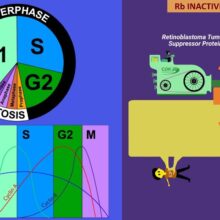Cell Cycle Regulation | Basic Overview

The cell cycle, or cell-division cycle, is the series of events that take place in a cell that cause it to divide into two daughter cells. These events include the duplication of its DNA (DNA replication) and some of its organelles, and subsequently the partitioning of its cytoplasm and other components into two daughter cells in a process called cell division. In cells with nuclei (eukaryotes), (i.e., animal, plant, fungal, and protist cells), the cell cycle is […]
Read more
